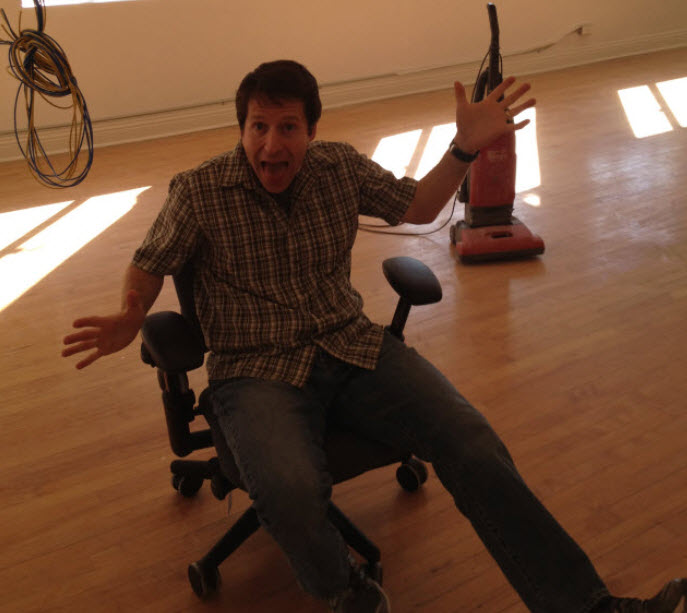Alex Seropian was in charge of huge video game business at Disney Interactive Studios, with more than 500 employees and $500 million revenues. But he wasn’t making games as he’s previously done at Halo-creator Bungie. And sometimes he had to take on the tough job of shutting studios and canceling projects.
So it’s no surprise to see Seropian moving back to making games. He has started a company called Industrial Toys to build mobile games for hardcore gamers, he told VentureBeat yesterday in an exclusive interview. After surveying the market at Disney, Seropian decided that the future wasn’t in $50 million console games, but in titles that a handful of people could build, like the games he’d made in the early days of gaming.
“There are some really great opportunities out there, especially in mobile,” Seropian said.
He left Disney a week ago and started Industrial Toys (@industrialtoys on Twitter) in Pasadena, Calif., on Monday. You might say he had a two-day break between jobs, but Seropian says he also worked on the weekend. “I’m so excited. I am full of energy now,” Seropian said. “Doing a startup is so much more interesting than being a corporate muckety muck. No vacation is required.”
Seropian is worth watching because he has a great track record as an entrepreneur. A Chicago native, he founded Bungie in 1991 with the publication of Operation Desert Storm. He teamed up with classmate Jason Jones to publish Minotaur: The Labyrinths of Crete. Both games sold about 2,500 copies, but they were a start. Bungie created more games, specializing in games of the Apple Macintosh.
In 2000, Microsoft acquired Bungie because it was making a cool sci-fi game with outstanding graphics. Apple’s Steve Jobs railed at Bill Gates for stealing Apple’s best Mac game developer, to no avail. Bungie went on to create Halo: Combat Evolved for the Xbox. It was a smash hit, and the Halo series went on to sell more than 30 million units.
But Seropian tired of the big company life and left in 2002. He started a new game company, Wideload Games, in 2004. Wideload created Stubbs the Zombie in Rebel Without a Pulse in 2005 and then Hail to the Chimp in 2008. Disney bought Wideload in 2009 and, in the a case of the inmates taking over the asylum, Seropian took over game development at Disney.
“It was a sizable organization with studios around the world, big brands — a cool dream job,” Seropian said. “I enjoyed all of it. But my heart and soul lies in the creative and entrepreneurial realm.”
Seropian said of Disney, “They have been nothing but awesome with me. In most ways, it was a really great opportunity. The company decided to make strategic shifts in the gaming business.”
In fact, Disney bought social gaming leader Playdom for up to $763.2 million, and Playdom’s leader John Pleasants took over as chief of games at Disney, with Seropian under him. Bob Iger, chief executive of Disney, supported the wholesale transition into digital gaming and modern business models. That came with its share of challenges and the need to deliver financial results, Seropian said.
“I had to close a couple of studios and cancel projects,” Seropian said. “That’s never fun.”
Turning around Disney’s game business remains a work in progress, and Seropian had a hand in some of it.
Bill Roper, a veteran game maker, has taken Seropian’s place at Disney.
Seropian, meanwhile, gets to return to creative work. Stubbs the Zombie was the last project in which he had a close hand in creative production. Now he has funding and just five people in his company. They include Tim Harris, who ran a free-to-play web startup in Chicago; Brent Pease, who ran Bungie’s old studio in San Jose, Calif.; and Hardy LeBel, a former developer of the Halo games at Bungie.
They’ll be a small team among many. Michael Zyda, director of the USC GamePipe Laboratory, estimates there are 1,000 app development companies throughout the Southern California region alone.
To deal with that competition, Seropian says his company will focus on product quality.
“My whole plan is to differentiate what we are doing and to do something meaningful,” Seropian said. “We plan to design from the bottom up for the platform, not bring something over from the consoles to mobile.”
Seropian said he will do partnerships, but they won’t likely be like traditional developer-publisher partnerships. He is not seeking funding from publishers, for instance. As for mobile games, he’ll announce platforms and titles later.
“It’s a little Wild West, and that’s what makes it exciting for me,” Seropian said. “It’s similar to when I got in the game business in 1991.”
![]() VentureBeat is holding its second annual Mobile Summit this April 2-3 in Sausalito, Calif. The invitation-only event will debate the five key business and technology challenges facing the mobile industry today, and participants — 180 mobile executives, investors, and policymakers — will develop concrete, actionable solutions that will shape the future of the mobile industry. You can find out more at our Mobile Summit site.
VentureBeat is holding its second annual Mobile Summit this April 2-3 in Sausalito, Calif. The invitation-only event will debate the five key business and technology challenges facing the mobile industry today, and participants — 180 mobile executives, investors, and policymakers — will develop concrete, actionable solutions that will shape the future of the mobile industry. You can find out more at our Mobile Summit site.
VentureBeat's mission is to be a digital town square for technical decision-makers to gain knowledge about transformative enterprise technology and transact. Learn More

